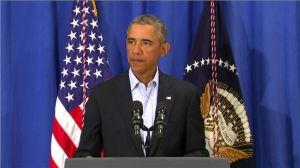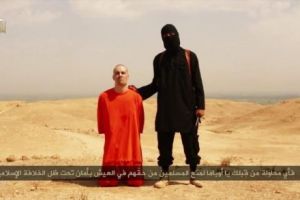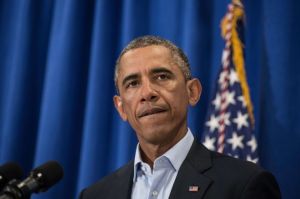
Thursday August 28, 2014
He kept faith with his military creed in ongoing air raids against Sunni Islamic State targets in Iraq -- in a war he had previously declared over.
WASHINGTON: An apparently looming American clash with Islamic State in Syria presents a defining test for President Barack Obama’s doctrine of often lethal, but limited, no-boots-on-the-ground warfare.
Obama’s worldview, cemented when US armies bogged down in Iraq, led him to a brand of war in which drones pound Al-Qaeda militants in Pakistan and Yemen and special forces materialize to pursue terror suspects in hostile lands like Libya and Somalia.
But as he contemplates targeting IS militants settling into a new caliphate, he is adamant his core policy of keeping ground troops back home is inviolate.
When Obama sketched his blueprint for flexing US power, at West Point military academy in May, he characteristically positioned himself between quagmire-wary realists and interventionists hooked on the hammer of US military power.
“A strategy that involves invading every country that harbors terrorist networks is naive and unsustainable,” Obama said, not knowing his theory would be tested so soon by the IS surge.
Obama’s rules of war allow unilateral force when US citizens and allies are in peril and emphasize drone strikes and air power. He seeks to back local partners to take on jihadists in the Middle East and international coalitions to share the military burden.
He kept faith with his military creed in ongoing air raids against Sunni Islamic State targets in Iraq — in a war he had previously declared over.
US force spurred modest advances by Iraqi and Kurdish forces against IS, also known as ISIL and ISIS, and ethnic Yazidis were spared from genocide.
But some critics question whether this pared-down approach will be decisive if the president, as expected, targets IS strongholds in Syria.
Not an enduring tool
The White House, despite warlike rhetoric pulsing through Washington, is tempering expectations that a military onslaught in Iraq, let alone Syria, will be decisive.
 “The sense of a lot of people … is that the most important, powerful and effective tool in the president’s toolbox is kinetic military action,” said White House spokesman Josh Earnest.
“The sense of a lot of people … is that the most important, powerful and effective tool in the president’s toolbox is kinetic military action,” said White House spokesman Josh Earnest.
“But what we have learned in very vivid terms over the last decade or so is that a US-led military operation is not an enduring solution.”
But the IS blitzkrieg in Iraq revealed limits of relying on local allies as the once-feared Peshmerga was patchy and Iraqi forces, built on US taxpayer billions, crumbled.
And despite the eclipse of Prime Minister Nuri al-Maliki, hopes for the “inclusive” Baghdad government Washington says is vital to crushing IS are far from fruition.
Deal with the Devil
In Syria, the search for partners is short and unpleasant.
Obama has been loath to arm moderate rebels, leaving anti-IS forces weak. The one potential ally with clout is President Bashar al-Assad. But Obama would have to swallow hard indeed to wage common cause with a man he sees as a war criminal.
Moreover, the track record of America and allies augurs ill for a new Middle East adventure.
Since the invasion of Iraq in 2003, through Libya’s slump into failed state misery, Washington’s attempts to clamp calm on regional havoc have foundered.
“There continue to be in Washington and in the Obama administration, people who fancy that somehow or other, American military power can restabilize what we destabilize,” said Andrew Bacevich, Professor Emeritus of International Relations at Boston University.
“I am skeptical of that.”
And US forces sent to pound Syria could be operating in the dark.
A former US official said that unlike in Afghanistan and Iraq, where Americans patrolled for years, and human and geospatial intelligence was plentiful, the military’s knowledge of Syria is limited, making it hard to pick targets.
It is not surprising then, that Obama, warned Tuesday that rooting out the IS “cancer” will not be “quick.”
‘Refusing to lead‘
 Still, many power players are convinced a new Middle East front is needed, and could work.
Still, many power players are convinced a new Middle East front is needed, and could work.
Martin Dempsey, chairman of the Joint Chiefs of Staff, says IS can only be defeated if hit in Syria as well as Iraq.
There is strong support for significant aid for Free Syrian Army Forces.
“You can’t contain ISIS, you have to defeat it,” Republican Senator John McCain, who backs US air strikes in Syria.
“This president doesn’t want to lead,” McCain told CNN.
Howard “Buck” McKeon, Republican chairman of the House Armed Services Committee, wants IS “defeated and destroyed” with a diplomatic, political and military offensive.
Other foreign policy chieftains warn Obama may have to deal with the devil, amid fears IS zealots armed with Western passports could hit the US homeland.
“The Assad government may be evil — but it is a lesser evil than ISIS, and a local one,” Richard Haass, president of the Council on Foreign Relations, argued in Wednesday’s Financial Times.
Though the White House refuses to work with the Syrian leader, he looms large, because he would win if IS is extinguished.
The White House demurs when asked when Obama, who travels to Europe next week for the NATO summit, will make up his mind.